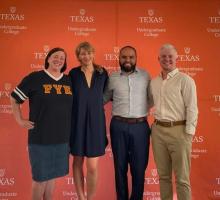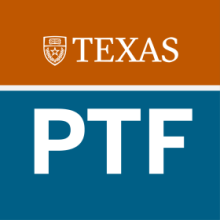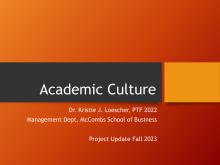PTF Impacts
Provost's Teaching Fellows have made lasting impacts in their departments, colleges and schools, all of the University of Texas, and even the broader scholarship of teaching and learning. Through both individual initiatives and university-wide programs, PTFs continue to serve as catalysts for positive change and further our campus culture of teaching and learning.
Displaying 1 - 17 of 17
Be Well to Do Well (Signature Course Resource)
This video project was designed to be shown in all Signature Courses at UT. Together with a discussion prompt, the video aims to acquaint students with mental and physical health resources on campus, and to teach them strategies for success.

Teaching Tips 2023-2024
Each year, the PTF Chair-Elect has the opportunity to share recurring Teaching Tips with the all faculty at UT.
Teaching Climate Change Canvas Module
A campus-wide faculty learning community constructed a canvas sandbox website where we could share materials related to climate change, with annotations, with the broader UT community. We collected our groups materials, and tried to organize them in a useful way. This includes lectures, activities, quizzes, projects, pre/post tests, etc. We organize both by learning objective, and by course. Our website is now live. A publication on pre/post survey results is being prepared.
Bringing Introductory Astronomy to a Broad Audience via Web-based Instruction
In 2024, I piloted a new web-based version of Astronomy 301 (Introductory to Astronomy), and taught it a second time in 2025. I attempted to include best practices for active learning, which was a challenge in this environment.

Teaching as Well Being (UT System)
3 different PTF projects presented:
Loescher project focuses on: Elevate excellence in the classroom through new strategies to understand, measure, and improve rigor in all courses
•each class is designed and delivered with the expectation of students learning at high levels •each student demonstrates learning at high levels
•each student is supported so they can learn at high levels
View the poster here

Teaching Tips 2022-2023
Each year, the PTF Chair-Elect has the opportunity to share recurring Teaching Tips with all faculty at UT. These messages cover a variety of topics, styles, and methodologies, from brief and practical classroom strategies to in-depth conversations with voices from across campus.
This year’s Teaching Tips were written by Chair-Elect Nina Telang, from the Chandra Department of Electrical and Computer Engineering.

The Evolution of Peer-Assisted Learning: From SI to PLUS (ASEE)
Former PTF chair Nina Telang co-presented this paper at the American Society of Engineering Education (ASEE) Annual Conference in August 2022.

Teaching Tips 2021-2022
Each year, the PTF Chair-Elect has the opportunity to share recurring Teaching Tips with all faculty at UT. These messages cover a variety of topics, styles, and methodologies, from brief and practical classroom strategies to in-depth conversations with voices from across campus.
This year’s Teaching Tips were written by Chair-Elect Jessica Toste, from the Department of Special Education.

Supplemental Instruction (SI) Program for Electrical and Computer Engineering
For her Provost's Teaching Fellows initiative, Nina Telang developed of a Supplemental Instruction (SI) program in a sophomore-level Electrical and Computer Engineering course, EE319K: Introduction to Embedded Systems.
Supplemental Instruction (SI) study sessions to help students succeed in introductory courses by employing a peer teaching model. SI Leaders – TAs or peers who have already successfully taken the course – plan and lead two identical, voluntary SI sessions each week, which students can join at any point in the semester.

Implementation of a new student initiative: Promoting Student Success and Well-Being (ASEE Gulf-Southwest)
Former PTF chair Nina Telang co-presented this paper at the American Society of Engineering Education (ASEE) Gulf-Southwest Annual Conference in March 2021. This paper shares a detailed look into the implementation of a new student initiative focused on promoting student success and well-being.
Read the complete paper <here,> or find the abstract below.

BIM for Design Coordination: A Virtual Design and Construction Guide for Designers, General Contractors, and MEP Subcontractors
PTF Fernanda Leite authored the academic text BIM for Design Coordination: A Virtual Design and Construction Guide for Designers, General Contractors, and MEP Subcontractors. Leite's book includes a chapter specifically about teaching Building Information Modeling (BIM) in college courses titled "BIM Teaching Considerations," which is directly related to the work done in her PTF Initiative.
View the chapter here, or read the summary below.

Integrating an Architectural Engineering Undergraduate Program with Building Information Modeling (Journal of Architectural Engineering)
PTF Fernanda Leite co-authored this article in the Journal of Architectural Engineering. The article examines the integration of Building Information Modeling (BIM) into an undergraduate Architectural Engineering course, which was a core component of Leite's PTF Initiative.
Read the complete paper here, or find the abstract below.

Qualitative and Quantitative Impact of Metacognitive Interventions in Supplemental Instruction Sessions (ASEE)
Former PTF chair Nina Telang co-presented this paper at the American Society of Engineering Education (ASEE) Virtual Annual Conference in June 2020.

Effectiveness of the Supplemental Instruction Program in First-Year Engineering Courses - A Longitudinal Report (ASEE)
Former PTF chair Nina Telang co-presented this paper at the American Society of Engineering Education (ASEE) Annual Conference in June 2019.

Drivers Exercise
Before deciding what your career goals are, it’s critical to know what you value most in a job. What gets you out of bed to go to start the day, go to work, and/or live your life? This exercise will help you define and prioritize what drives you. We provide definitions of 8 common "drivers". Once you understand these drivers, you can take the exercise and go through a ranking process to determine which are most important to you (i.e. you’re less likely to compromise on these) and which are less important (i.e. you’re more willing to compromise on these).

